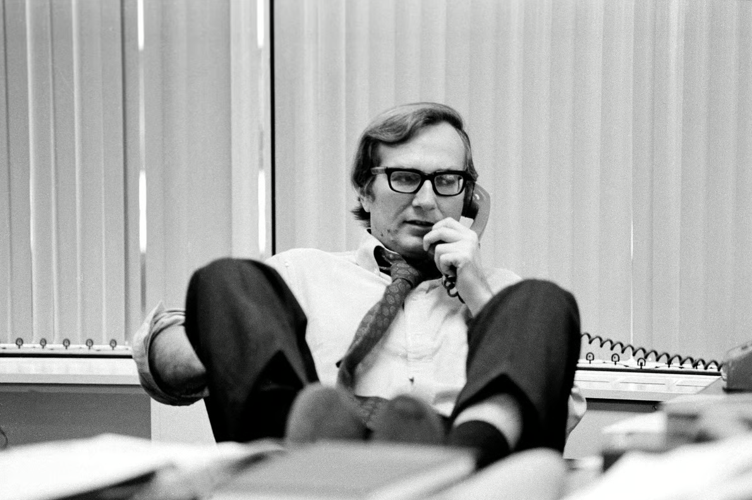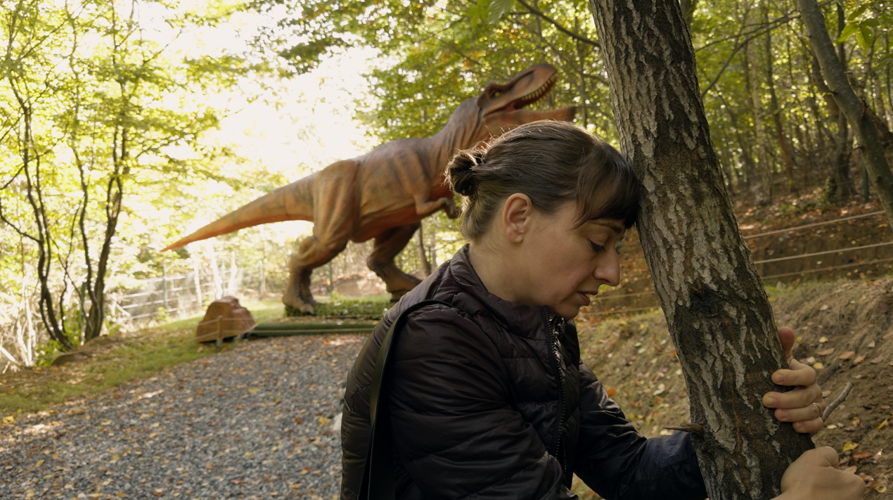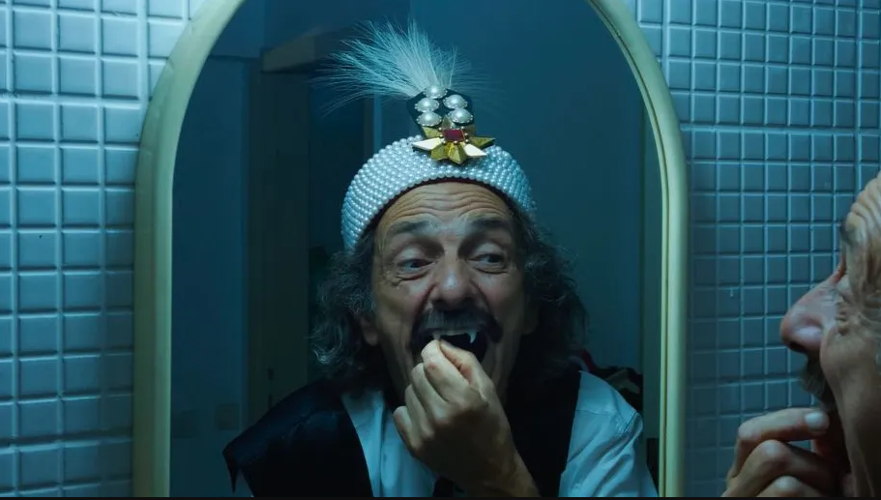Here we are with the last installment of Film Festival Foolishness, in which three weeks' worth of screenings get distilled down into something to look through over Thanksgiving leftovers, or brunch conversations about the future of art with your loved ones. (Previous dispatches can be found here and here.) This is a chance to just make a note of a title that interests you for whenever it pops up in the future, or something to Google because you’re hooked.
The focus is mainly on the 63rd New York Film Festival here, but we also have coverage of NewFest (NYC’s preeminent LGBTQIA+ festival) and the Brooklyn Horror Film Festival. And it all adds up to sheer, overwhelming joy.
From 'Stiller & Meara' to 'Mister Scorsese,' here’s a sampling from this year’s NYFF, NewFest and Brooklyn Horror Film Festival — with more to come
What if Butch Cassidy and the Sundance Kid, Enter the Dragon, Oklahoma! and The Wild Bunch were all the same movie? Well, good news everyone, because that film exists, and it is Ramesh Sippy’s 1975 epic Sholay (The Final Cut). For decades the most successful Indian film globally, it’s now been given a 4K restoration with its original pre-release ending restored, and this film plays like gangbusters. It covers every base, works all the emotions, and even today, when Amitabh Bachchan and Dharmendra show up, thunderous ovations result. There’s a transcendent musical number that starts like Busby Berkeley and ends like Sam Peckinpah, a masterful battle on a train, and more of everything that you could want from a film. I saw 41 films during my 20 days covering festivals in NYC, but the U.S. premiere of the restored Sholay was the most electric experience. I hope it gets a full U.S. release, because it delivers everything that Indian cinema offers, and I can’t wait to see it again.
If Christopher Nolan, Guy Maddin and Wong Kar-wai got in an absinthe fight with detectives and robots in a wax cathedral, you might get a dizzying marvel like Bi Gan’s Resurrection. It’s coming at some point in early 2026, and it’s just glorious, spanning genres and styles with the kind of easy grace you only get from a director kicking into high gear and tearing off into the horizon. It’s the kind of of film where you feel like there might be just a tad of something hallucinogenic on your popcorn — but Bi knows what he’s doing, and it is just a rapturous ride.

Cover-Up
It’s always nice to check in on some of global cinema’s auteurs and what they’ve been up to as of late. Documentarian Laura Poitras (All the Beauty and the Bloodshed, CitizenFour), in collaboration with Marc Obenhaus, brings us Cover-Up, turning the camera on legendary investigative journalist Seymour Hersh — the man who helped make the My Lai Massacre into something that America could not look away from, as he would later do with the horrors at Abu Ghraib. Hersh is a charming and thoughtful subject, and his concerns regarding the very project he’s participating in provide a very real foundation for the work. It’s a fascinating examination of a life spent trying to ward off so much of what is taken for granted as standard operating procedure at this moment in history, and it’ll haunt you as well.
Kleber Mendonça Filho is back with The Secret Agent (opening at the Belcourt Dec. 12), a crowd-pleasing political epic that keeps the battle for social freedom squarely in the milieu of righteous and sexy, with a towering Cannes prize-winning performance from Wagner Moura (Futuro Beach, Narcos, Civil War) as the kind of decent human being we really wish the world had more of. Mendonça also won the award for Best Director, and rightfully so — this has the vibe of a classic: tense, vibrant, lived-in, fanciful, and inescapable in its world-building.
And Jim Jarmusch gets profoundly sneaky with Father Mother Sister Brother; it won the Golden Lion at this year’s Venice Film Festival, and at first feels almost slight, with three stories of different families gathering under somewhat strained circumstances that, as you take the time to knock it around in your mind afterward, becomes overwhelming in its portrayal of the work we do to hold family ties together. The casts are superb (Jeopardy! fan Jarmusch deserves props for casting Adam Driver and Mayim Bialik as siblings, likewise Cate Blanchett and Vicky Krieps), and Jarmusch as always has a gift for dramatizing the schism between what people say and what they mean.
Nobody does deeply comic and bleakly real like Park Chan-wook does, and his adaptation of Donald Westlake’s The Ax, No Other Choice (opening in Nashville Jan. 2), is a film that understands the cumulative derangement that comes from dental pain, as well as the damage that economic chaos can do. It’s the perfect Christmas season movie for 2025, and it is relatable in ways both wrenching and ironic, especially if you’re terrified about long-term employment prospects. Son Ye-jin for MVP and for Best Shoes, without hesitation.
A hypnotic and haunting documentary that finds a way to untangle the drone shot from its messy and horrifying history, Nuestra Tierra (Landmarks) boasts mechanics and objectives that could be alluring for fans of true crime documentary, but there’s so much more going on here. Lucrecia Martel (The Headless Woman, Zama) has a gift for finding the visual drama in unspoken rifts, and this will have you digging deep in the history of Argentina and its Indigenous peoples.
Last Night I Conquered the City of Thebes is a weirdly moving take on the "dudes rock" subgenre, nimble in narrative and jumping through time in a way that feels organic and affectionate. At times it feels like a Maxfield Parrish painting given life, letting the sumptuousness of nature and the mysteries of The Land be the backdrop for the evolution of human vulnerability. The opening credits are the single most adventurous drone shot of the year.
At two hours and 40 minutes — brisk for writer-director Lav Diaz — Magellan is an indelible experience that fixates on the hypnotic horrors of history. A good axiom by which to live your life: Don’t conduct yourself in a way that will find audiences cheering your severed head being held aloft and danced around a fire with, which is honestly something most of the explorers that history holds up would have done well to consider. Artur Tort is one of the greatest cinematographers we have working today, and everything levels up when you hear how the production team decided upon casting Gael Garcia Bernal.
It is entirely possible that Ulrich Köhler is spending a significant amount of Gavagai making fun of Claire Denis. There’s a lot here to process, including a preëmptive film festival press conference sequence, the mechanics of international racism and a series of excerpts from the film within this film, an adaptation of Medea made as an international co-production with Senegal. The discourse should be something, because the performances are 100 percent giving everything.

Kontinental ’25
Always one for finding new ways to surprise an audience, Radu Jude brought two films to NYFF63, and Kontinental ’25 manages to be a serious meditation on guilt and responsibility for our fellow human beings as well as a low-key confrontation with the moral blinders everyone has to put on just to be a participant in the world at the moment. Less shit-stirring than the majority of his other films (and fear not, we’ll get to Dracula), this is still asking questions that even the hardest-core of global art cinema step back from. There’s also three or four minutes that promise the most unexpected Jurassic Park sequel one might imagine.
There really should be a name for the kind of bisexual three-way that helps kill colonialism for a little while. I Only Rest in the Storm is a perceptive docufiction that balances its discourse and its densely erotic vibe in a way that feels both alluring and brutal. Cleo Diára rules, in one of the best performances of the year with two amazing wig reveals, and our enigmatic lead Sérgio Coragem finds a way to incarnate a living dialectical exercise, which is really an impressive feat for a film this hardcore in its political theory and its sexual content.
A gutsy, manipulative, and shameless collision between Morvern Callar and Sorcerer, with a Pink Floyd: Live at Pompeii beginning and an ending that shouts out both Lucio Fulci and Michael Haneke, Sirāt is not for everyone (the press corps at the NYFF screamed at several points), but absolutely worth seeing in the biggest, loudest theater possible without reading anything else about it. In that way, it’s like Twilight Breaking Dawn: Part 2. But only in that way. Just know this — you can never outrun your raver years. And a good axiom for film festivals is that if something is equally heralded at genre fests and in more "respectable" contexts, watch out, because you’re not safe.
Fresh off her scene-stealing turn in Louise Weard’s Castration Movie Anthology: Chapter II, Australian treasure Alice Maio Mackay is back with The Serpent’s Skin (BHFF, NF) a film that takes time-tested horror methodologies (cursed art) and you-are-there moments of queer youth color and lets them loose in a concept no one ever thought of before (what if Scanners, but trans ...). No one gets the vibe of Right Now like Mackay.
The first half of Barrio Triste is exhausting; very much of a piece with the EDGLRD-period work of executive producer Harmony Korine in that it has a great score and a ChatGPT approach to characterization (i.e., “What would it sound like if there were characters who were actually speaking to one another?”) that yields countless variations on the same scene again and again. But it does build, evolving into something that actually registers as it goes along, ultimately feeling like a Colombian take on Bi’s Long Day’s Journey Into Night. There’s an exceptional monster, and a fascinating tech situation where several of the dead pixels in the camera feel like newly discovered constellations that add an unexpected amount of cosmic power to some of the later developments.

Lesbian Space Princess
There always needs to be a place for something sweet and fluffy like the Australian animated feature Lesbian Space Princess (NF), which deftly thwarts a lot of knee-jerk expectations with a zippy (and ultimately therapeutic) take on making yourself a more actualized person by not defining yourself through your relationships. The villainous menace are the Straight White Maliens, and everyone has the tendency to be a secret singer-songwriter, and it’s kind of delightful.
Anything That Moves (BHFF) is an erotic thriller for the rideshare/Postmates/OnlyFans era, with smart characterization and an effective and unsettling central mystery. Newcomer Hal Baum delivers a great performance, one without which the film couldn’t possibly cohere to the extent it does. Egalitarian in its hornitude, but also genuine in its humanity. Writer-director Alex Phillips gives Chicago seedy a starry-eyed tune-up that doesn’t wear out its welcome.
We’ve all got our something that sets us off and sets us apart. And there’s nothing that hits quite as hard as a portrait of a messy situation that is defiantly not our own story, but that allows the viewer to find their own commonalities. I’ve never been hydrophobic, but The Currents does a very good job of getting at how while we all have our own hyperspecifics, the way we process them taps into a very real and way more expansive kind of empathy. Or at least it ideally should. An unexpected spike in the brain from writer-director Milagros Mumenthaler.
Oklahoma’s favorite son Mickey Reece is back with Every Heavy Thing, a 21st-century noir that scratches the itch of singular whatsits like Cheap Thrills, Blue Steel and Looker. There are so many ideas happening that sometimes you just have to step back and soak in its distinctive eye — this feels eerily like a future just a few months down the road. With great work from Josh Fadem, Barbara Crampton, James Urbaniak and Vera Drew, as well as deeply upsetting concepts. Reece can do just about anything, and this is the latest example.
From ‘Sentimental Value’ to ‘Rose of Nevada,’ here’s more good stuff from this year’s NYFF, NewFest and Brooklyn Horror Film Festival
You have never seen anything quite like Dead Lover (BHFF), a remarkable and quotable Frankenstein tale made by a tiny cast and crew with everyone playing multiple parts with a lush design aesthetic that recalls Ken Russell, Derek Jarman or just what would happen if someone gave the theater students a bunch of Baudelaire and molly. Director/star Grace Glowicki has made a perverse and picaresque little masterpiece here, not to be missed. This won Best Picture at the 2025 Knoxville Horror Film Festival, and rightfully so.
The Mastermind (streaming on MUBI Dec. 12) is a difficult nut to crack. I did not become a film critic to be a hater, so it brings me no joy to call this the most disappointing Kelly Reichardt film. There’s a great first half-hour, and a killer central performance from Josh O’Connor (as well as a two-scene wonder of a turn from Gaby Hoffman). But as it goes on, to make its point it withdraws and diminishes, and there’s nothing to grab hold of. Also, how are you going to give Alana Haim almost nothing to do? Even One Battle After Another at least gave her that transcendent moment with the Joyce DeWitt wig.
Somehow diffuse and jagged at the same time, the latest from Kent Jones (a man I’d always hoped to cast in a David Lochary biopic), Late Fame is a measured portrait of how artistic enclaves shift and change through the years, with Samy Burch (May December) adapting Arthur Schnitzler (Traumnovelle). Willem Dafoe shines, and Greta Lee steals the whole thing (her showstopping “Surabaya Johnny” is a glittering treasure), walking the tightrope between serving and recoiling. Not a cringe film, but a film about cringe, and its razor-sharp vivisection of a GSID student leaves one to feel seen and called-out in the most wrenching of ways. A Damien Hirst installation of the protracted cruelties of time.
It’s always difficult to talk about a film that has a truly unexpected and triumphant surprise tucked inside it. Giving it well-deserved awareness nonetheless diminishes its secret, even if just a little. But the Italian "Dudes on a Middle-Aged Road Trip" dramedy A Last One for the Road is an effective character study, a Glory Days flashback with the mid-’90s in the rearview mirror, rolling away, that gets major points for not dwelling on the sadness and existential dread lurking just around the frame because nothing it can depict is going to match what the passage of time is doing in your head. Deserves several prizes for keeping tonal balance, and maximum respect to Pierpaolo Capovilla for keeping it real and unexpected.
As far as the two Richard Linklater films at this year’s NYFF, I much preferred Blue Moon, but part of that is just because as charming as aspects of this one can be, it’s really hard to surmount how much so many of the involved parties would have hated it. As Jean-Luc Godard, Guillaume Marbeck is appropriately puckish and nearly insufferable, which feels correct. Nouvelle Vague (now streaming on Netflix) is brisk and will hopefully drive more interest toward the extant work from the French New Wave, but it’s never more than two steps away from sitcom territory, which kneecaps some of the really effective work that Zoey Deutch is doing as Jean Seberg. Your mileage may vary.

Dracula
In all honesty, Radu Jude’s Dracula feels like a more fitting tribute to Godard than Nouvelle Vague does. This filthy, periodically AI-addled (for a point) dumb-as-shit but also grad-school-brilliant film is stuffed with more audacious choices and unexpected detours than you could possibly imagine. Jude is an artisan of rage, and a keen observer of the violence exerted against the public by the powerful. So of-this-moment and aware of what it’s doing that it transcends any sort of qualitative continuum, this is deeply special, and I would happily wish many more people would see it — even though a lot of them would hate me for doing so. Too saucy for Nashville theaters, but essential viewing nonetheless.
An ongoing two-step between wrenching and wanky, Jay Kelly (streaming on Netflix beginning Dec. 5; review coming next week), the latest from Noah Baumbach, keeps you tangled up in a skein of complicated responses. I enjoyed it more than I expected to. George Clooney is digging into something for this, and he’s matched by Adam Sandler in dramatic mode. You almost wish they’d focused more on their business friendship than the ongoing attempts of Clooney’s Kelly to win his adult kids back over, simply because we see movies about selfish dads trying to make it right with their family pretty regularly. Also, Sandler’s scenes with Greta Gerwig as a Hollywood power couple are a delight, and I’d honestly watch a spinoff series about the two of them having a family in the modern era. I am shocked that the Safdie joke made it into the final script.
Blknws: Terms and Conditions is an Afrofuturist document — a speculative future and better past that hints at something more than [flailingly gestures at the outside world] all this. Informative and always smooth and deliberate, this is the kind of work you could build an entire series around, much in the way it has expanded from artist Kahlil Joseph’s installation piece. There’s so much to be found within, but Blknws never feels overwhelming or too much. It is boundless, and deeply thrilling.
Utterly devastating, but not for the reasons one might expect from the title, With Hasan in Gaza is composed of footage shot in 2001 while director Kamal al-Jafari sought out a friend he’d been unable to reconnect with. He travels around Gaza trying to solve a mystery. And simply everything you see is gone. None of what al-Jafari has captured here still exists. So as the viewer, we also aim to solve a mystery in a city made of ghosts. Mercilessly tense at times, but sometimes disarmingly human and relatable. Like nothing else out there.
The newest film from the outstanding Ira Sachs, Peter Hujar’s Day (opening at the Belcourt on Dec. 5; review also coming next week) is a focused slice-of-life I can honestly see not necessarily working for everyone, but I was absolutely captivated. A loving tribute both to one of the great photographers and to a time and space that only exists in memory anymore, this casts a spell that lets the lost beloved live once more. Ben Whishaw and Rebecca Hall are simply exquisite.
A fascinating biopic that excels when it bypasses the Wiki and makes for the weird, Duse depicts the life of the legendary Italian actress Eleonora Duse (Valeria Bruni Tedeschi). Typical biopics are only as interesting as the life they’re dramatizing, and director Pietro Marcello periodically breaks through to something different, whether it’s a serious reckoning with what happens when an artist inadvertently allows their legacy to be clouded by fascist collaboration, or moments that feel like a three-way collision between The Conformist, Mommie Dearest and Esther Kahn. Absolutely the best line of the year takes place when a supporting character is admonished for being effeminate onstage, and then responds: “Faggotry is necessary; progress demands it.”
A few short films to keep an eye out for: Author and documentarian Keir-La Janisse makes her narrative debut with a chilling Algernon Blackwood adaptation, “The Occupant of the Room” (coming to Shudder Dec. 1), a Christmas ghost story that feels of a piece with the BBC classics that feel like they’re lurking in its DNA. It’s hopefully the beginning of a new tradition for modern filmmakers, similar to the Tales From the Woods series (also at BHFF), where four of our contemporary horror greats tackle classic fairy tales. Adam Egypt Mortimer’s “Cinderella,” even with its ecopocalyptic future setting, feels the most traditional, cutting to the bone figuratively and literally to get at the dark heart of the Perrault tale and to indulge in some splattery class warfare. But Benson and Moorhead’s “Jacques the Giant Slayer” is an inspired take on its source material (loving the conflagration between archaeology and cinema), and Mattie Do’s “The Sleeping Beauty” is the kind of mindfuck that stays with you long after it’s over — the kind of short that you hope educators use as an example of how to build a world and burn it down in 15 minutes.
With this final installation and the two previous dips into the abundance of festival offerings available up north should you be willing to put the time (and dollars) into it, not only are you prepared for the next year-and-change of global cinema, but you also understand why I’m so tired in the back half of October and the ramp-up to Thanksgiving. Hope to see you at the movies.












